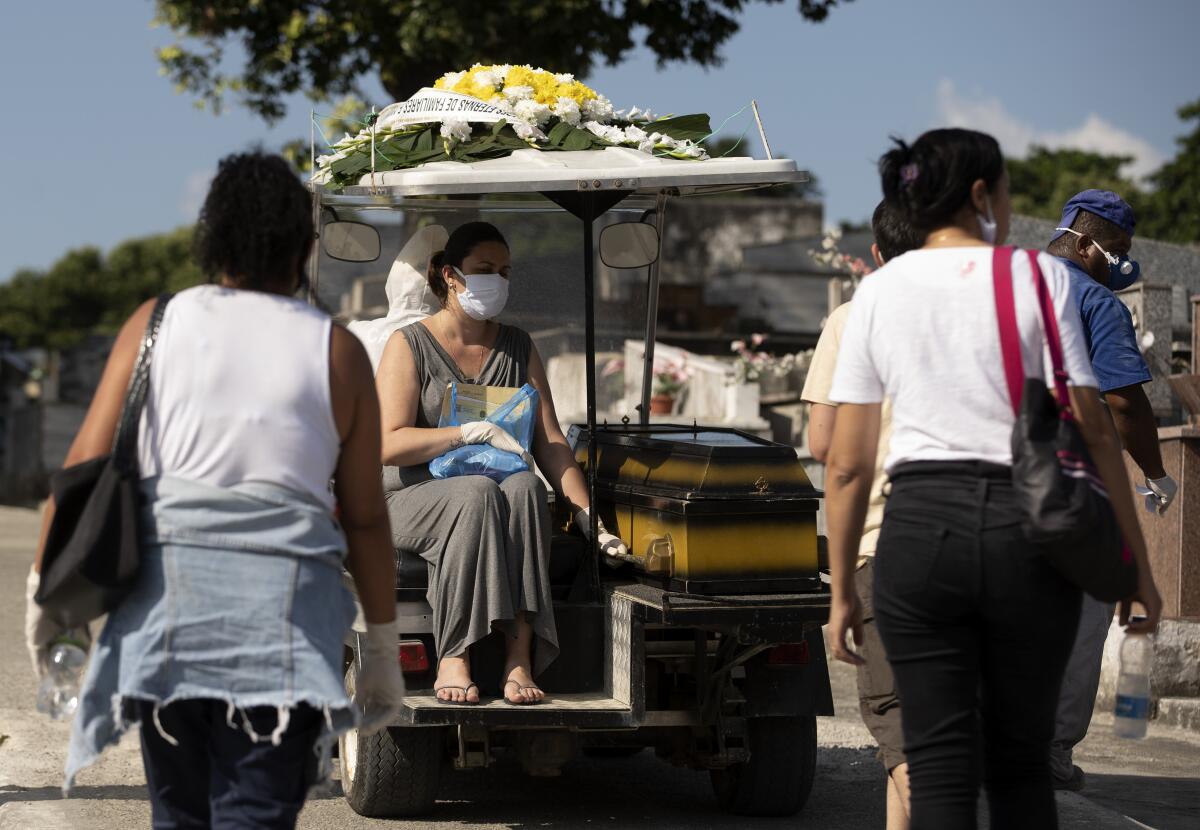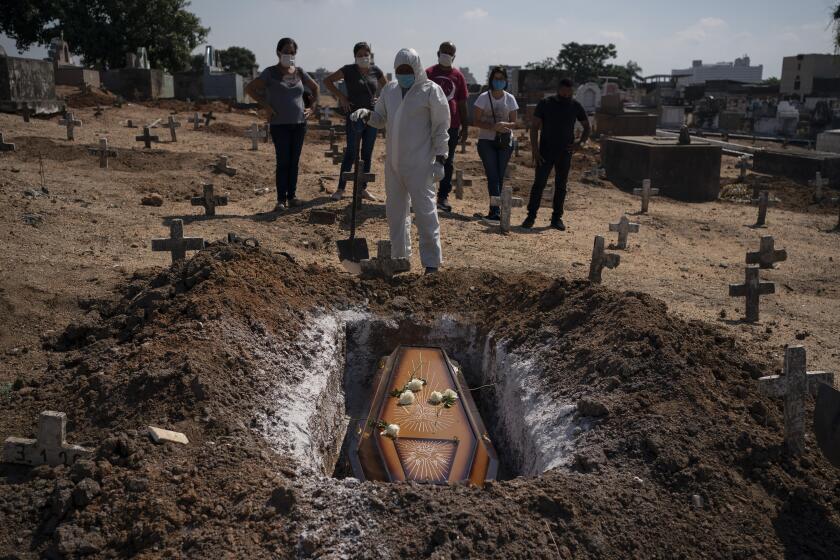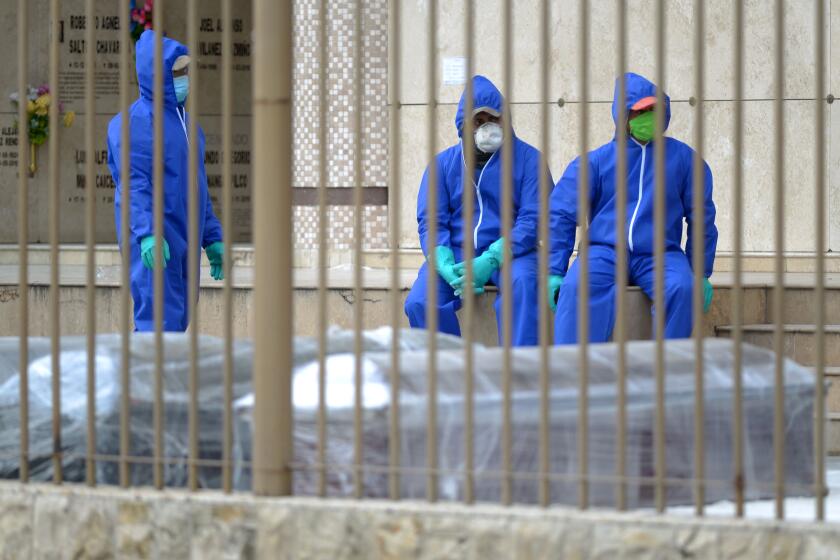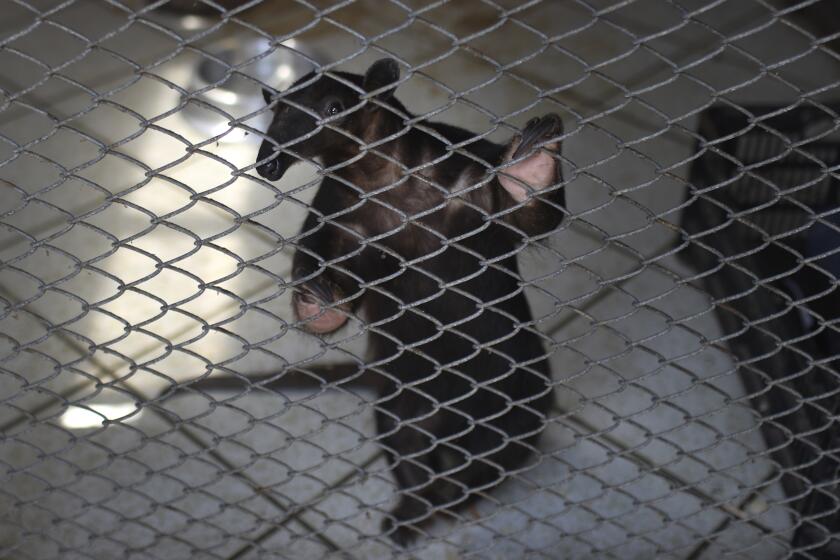Is Brazil the next big coronavirus hot spot as other nations ease up?

- Share via
RIO DE JANEIRO — Brazil is emerging as potentially the next big hot spot for the coronavirus amid President Jair Bolsonaro’s insistence that it is just a “little flu” and that there is no need for the sharp restrictions that have slowed the infection’s spread in Europe and the U.S.
As some U.S. states and European countries moved gradually Monday to ease their limits on movement and commerce, the intensifying outbreak in Brazil — Latin America’s biggest country, with 211 million people — pushed some hospitals to the breaking point, with signs that a growing number of victims are now dying at home.
“We have all the conditions here for the pandemic to become much more serious,” said Paulo Brandao, a virologist at the University of Sao Paulo.
Brazil officially reported about 4,500 deaths and almost 67,000 confirmed infections. But the true numbers there, as in many other countries, are believed to be vastly higher given the lack of testing and the many people without severe symptoms who haven’t sought hospital care.
Some scientists said more than 1 million in Brazil are probably infected. And the crisis could escalate as the country heads into winter, which can worsen respiratory illnesses.
The country’s Health Ministry said that the system for accounting for deaths is “robust” and has captured all but a few cases.
Worldwide, the death toll topped 210,000, according to a tally by Johns Hopkins University. The number of dead in the U.S. surpassed 55,000 — close to the 58,000 U.S. troops killed during the Vietnam War. Italy, Britain, Spain and France accounted for more than 20,000 deaths each.
In Brazil, Bolsonaro has disputed the seriousness of the coronavirus and said people need to resume their lives to prevent an economic meltdown. But most state governors in the country have adopted restrictions to slow the spread and pushed people to stay at home.
In mid-April, Bolsonaro fired his popular health minister after a series of disagreements over efforts to contain the virus, replacing him with an advocate for reopening the economy. Residents protested, leaning out their windows to bang pots and pans.
Medical officials in Rio de Janeiro and at least four other major cities have warned that their hospital systems are on the verge of collapse or too overwhelmed to take any more patients.
Officials in Rio de Janeiro and at least four other major cities warn that their hospital systems are on the verge of collapse, or already too overwhelmed to take any more patients.
Officials in Sao Paulo — the largest city in South America, in a tightly packed metropolitan area of more than 21 million residents, many of them living in poverty — have issued death certificates over the last two weeks for 236 people who succumbed at home, double the number before the outbreak, according to the SAMU paramedic service.
Manaus, an Amazon city of 1.8 million, recorded 142 deaths on Sunday, the most yet, including 41 who died at home. In the main cemetery, workers have been digging mass graves. Brazil’s funeral industry warned last week that the city was running out of coffins and “there could soon be corpses left on corners.”
Images of corpses in Ecuador stoked fear of the coronavirus’ effect on developing nations. Infections have yet to peak elsewhere in Latin America.
In the U.S., the governors of Nevada and Colorado announced that their states will join their three West Coast counterparts in coordinating their reopenings. West Virginia’s governor unveiled an aggressive plan to reopen his state’s economy based on a loosening of previously announced testing benchmarks.
In Massachusetts, however, officials reported the state’s 3,000th death from the virus. The state is “still in the surge and very much in the fight against COVID-19,” Gov. Charlie Baker said.
In Georgia, where Republican Gov. Brian Kemp has moved decisively to let businesses reopen, restaurants received the go-ahead to resume dine-in service as long as they follow certain restrictions, including keeping tables 6 feet apart.
At Plucked Up Chicken & Biscuits in Columbus, Ga., eight regulars showed up in the morning to have their coffee and breakfast and “chatted at each other across the room,” manager Alesha Webster said. But only 10 customers could be inside at a time, well below the capacity of 45.
Zoos and breeding centers in Peru say they’re running out of feed for their animals as the coronavirus pandemic keeps paying customers at home.
Alex Brounstein, owner of the Atlanta-based chain Grindhouse Killer Burgers, had no plans to reopen right away. “You’re talking about people putting their mouths on things in your restaurant. You now have dirty dishes going back into your kitchen. To me, it’s just completely illogical,” he said.
Technology is likely to play an important role in helping countries ease their restrictions. Many countries, including Italy, France, Switzerland and Britain, are working on virus-tracking apps and other means of reducing the labor-intensive task of tracing infected people’s contacts.
In Australia, with about 80 COVID-19 deaths, 1.1 million of the country’s 26 million people downloaded a new contact-tracing app within 12 hours of its becoming available.
In another encouraging sign amid the gloom, New York state reported 337 deaths for the lowest daily count this month, down from a high of nearly 800 almost three weeks ago.
And Italy registered its lowest day-to-day number of new cases of COVID-19 since practically the first day the country was put under lockdown in early March.
More to Read
Sign up for Essential California
The most important California stories and recommendations in your inbox every morning.
You may occasionally receive promotional content from the Los Angeles Times.













